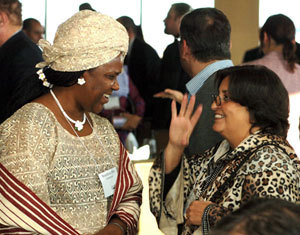Learning, Listening and leadership in cross-cultural Partnership.

I contemplated naming this post “Thank you, Yali and Diamond”. There is a lot to reflect on in Diamond’s book “Guns, germs and steel”. Even though the book is steeply grounded in the theory and science of human evolution, the author, masterfully lays out data that shows how modern history has been shaped by conquest. Diamond takes his readers on “… a whirlwind tour of human history on all the continents, for millions of years, from our origins as species until 13,000 years ago.”[1] A conquest of the world by Europeans is a visible theme in the book. A few powerful men armed with the power of guns, germs, steel panel beaten in piercing and lethal weaponry. Indeed, a tale that is common place in the history of many who are survivors of colonial rule and those who are still impacted by the legacies of oppression and imperialism. With military might, deadly microbes and technology, there was no limit. Diamond, seeks to unearth certain questions namely: How did European gain search an inequitable advantage over the rest of the world? How have guns, germs and steel contributed to shaping the world and the cascading gap between the “haves and the haves not? Indeed it is a timely question especially when Gongloff of the huffing post recently writes: “…the rich will keep getting richer by doing basically nothing, living off the income generated by their already massive wealth. For many hedge-fund managers, that future is now. The world’s 25 best-paid hedge-fund managers took home more than $21 billion in 2013, mostly for charging enormous fees for keeping an eye on huge piles of money, according to a new tally by Institutional Investor’s Alpha magazine.”[2
Although, the book “Guns, Germs and Steel”’s message seems to reverberate with current global disparities; I was captivated by the origin of the spark and curiosity that motivated the author to investigate the source of inequalities in this world in the first place. Diamond writes:
After a while, Yali turned the conversation and began to quiz me. He had never been outside New Guinea and had not been educated beyond high school, but his curiosity was insatiable. First, he wanted to know about my work on New Guinea birds… He then asked how the ancestors of his own people had reached New Guinea over the last tens of thousands of years, and how white Europeans had colonized New Guinea within the last 200 years. … Whites had arrived, imposed centralized government, and brought material goods whose value New Guineans instantly recognized, ranging from steel axes, matches, and medicines to clothing, soft drinks, and umbrellas. In New Guinea all these goods were referred to collectively as “cargo.” All those things must have been on Yali’s mind when, with yet another penetrating glance of his flashing eyes, he asked me, “Why is ti that you white people developed so much cargo and brought it to New Guinea, but we black people had little cargo of our own?”
So why consider the heading “Thank you Yali and Diamond” as stated in the beginning of this post? It is because of Yali and Diamond’s courage and the cathartic nature of their relational dialogue, even with “tensions between the two societies …” they both represented.[3] Another reason has to do with the fact that I can relate to why “goods were referred to collectively as ‘cargo’” since for the most part “cargo” in Uganda meant a white person’s or “European luggage.”
I also saw the need to express gratitude to the example of mutuality, vulnerability. I was intrigued by the boldness between Yali and Diamond to ask the right questions. Diamond attempts to answer Yali’s provocative question with consideration of many perspectives. I will not be able to touch on all of them, but I would like to point out one of the many examples which is worth noting. Diamond’s story about the tragic conflict propelled by inequalities between “… the Morior and the Maori…”[4] hit home. While he started out with identifying unfortunate past of European conquest and colonial racism, the author also reveals the vicious cycle of oppression. Diamond asserts:
The tragedy of the Moriori resembles many other such tragedies in both the modern and the ancient world, pitting numerous well-equipped people against few ill-equipped opponents. What makes the Maori-Morior collision grimly illuminating is that both groups had diverged from a common origin less than a millennium earlier. Both were Polynesian peoples.”[5] This is what is happening in Southern Sudan.
There is need for the ability to learn, listen and a willingness to lead by way of serving in a manner that asks the necessary question. Like Yail and Diamond, followers of Christ need to be concerned about people impacted and affected by disparities. If the vicious cycles of violence and oppression persist, how much more a faith presence of a virtuous cycles?
Leave a Reply
You must be logged in to post a comment.